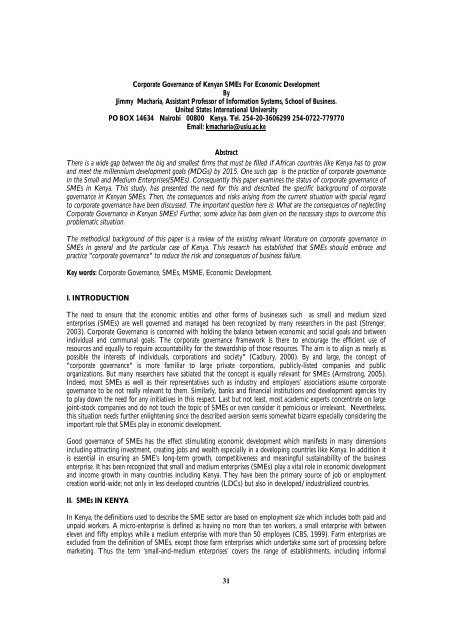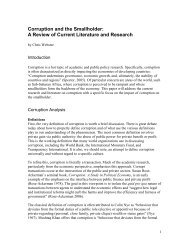13th Annual International Management Conference Proceeding
13th Annual International Management Conference Proceeding
13th Annual International Management Conference Proceeding
Create successful ePaper yourself
Turn your PDF publications into a flip-book with our unique Google optimized e-Paper software.
Corporate Governance of Kenyan SMEs For Economic Development<br />
By<br />
Jimmy Macharia, Assistant Professor of Information Systems, School of Business.<br />
United States <strong>International</strong> University<br />
PO BOX 14634 Nairobi 00800 Kenya. Tel. 254-20-3606299 254-0722-779770<br />
Email: kmacharia@usiu.ac.ke<br />
Abstract<br />
There is a wide gap between the big and smallest firms that must be filled if African countries like Kenya has to grow<br />
and meet the millennium development goals (MDGs) by 2015. One such gap is the practice of corporate governance<br />
in the Small and Medium Enterprises(SMEs). Consequently this paper examines the status of corporate governance of<br />
SMEs in Kenya. This study, has presented the need for this and described the specific background of corporate<br />
governance in Kenyan SMEs. Then, the consequences and risks arising from the current situation with special regard<br />
to corporate governance have been discussed. The important question here is: What are the consequences of neglecting<br />
Corporate Governance in Kenyan SMEs? Further, some advice has been given on the necessary steps to overcome this<br />
problematic situation.<br />
The methodical background of this paper is a review of the existing relevant literature on corporate governance in<br />
SMEs in general and the particular case of Kenya. This research has established that SMEs should embrace and<br />
practice "corporate governance" to reduce the risk and consequences of business failure.<br />
Key words: Corporate Governance, SMEs, MSME, Economic Development.<br />
I. INTRODUCTION<br />
The need to ensure that the economic entities and other forms of businesses such as small and medium sized<br />
enterprises (SMEs) are well governed and managed has been recognized by many researchers in the past (Strenger,<br />
2003). Corporate Governance is concerned with holding the balance between economic and social goals and between<br />
individual and communal goals. The corporate governance framework is there to encourage the efficient use of<br />
resources and equally to require accountability for the stewardship of those resources. The aim is to align as nearly as<br />
possible the interests of individuals, corporations and society" (Cadbury, 2000). By and large, the concept of<br />
"corporate governance" is more familiar to large private corporations, publicly-listed companies and public<br />
organizations. But many researchers have satiated that the concept is equally relevant for SMEs (Armstrong, 2005).<br />
Indeed, most SMEs as well as their representatives such as industry and employers’ associations assume corporate<br />
governance to be not really relevant to them. Similarly, banks and financial institutions and development agencies try<br />
to play down the need for any initiatives in this respect. Last but not least, most academic experts concentrate on large<br />
joint-stock companies and do not touch the topic of SMEs or even consider it pernicious or irrelevant. Nevertheless,<br />
this situation needs further enlightening since the described aversion seems somewhat bizarre especially considering the<br />
important role that SMEs play in economic development.<br />
Good governance of SMEs has the effect stimulating economic development which manifests in many dimensions<br />
including attracting investment, creating jobs and wealth especially in a developing countries like Kenya. In addition it<br />
is essential in ensuring an SME’s long-term growth, competitiveness and meaningful sustainability of the business<br />
enterprise. It has been recognized that small and medium enterprises (SMEs) play a vital role in economic development<br />
and income growth in many countries including Kenya. They have been the primary source of job or employment<br />
creation world-wide; not only in less developed countries (LDCs) but also in developed/industrialized countries.<br />
II. SMEs IN KENYA<br />
In Kenya, the definitions used to describe the SME sector are based on employment size which includes both paid and<br />
unpaid workers. A micro-enterprise is defined as having no more than ten workers, a small enterprise with between<br />
eleven and fifty employs while a medium enterprise with more than 50 employees (CBS, 1999). Farm enterprises are<br />
excluded from the definition of SMEs, except those farm enterprises which undertake some sort of processing before<br />
marketing. Thus the term ‘small-and-medium enterprises’ covers the range of establishments, including informal<br />
31
















